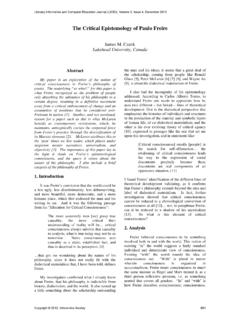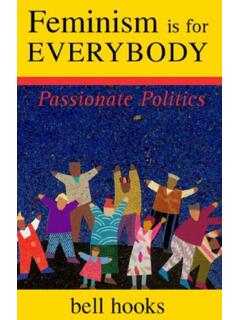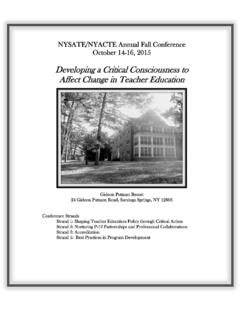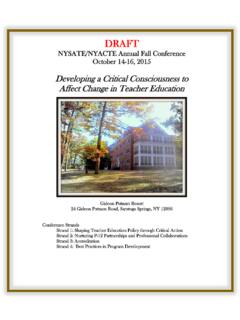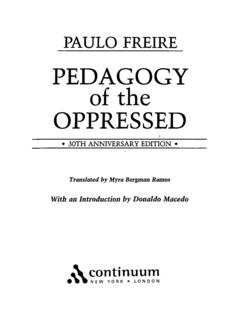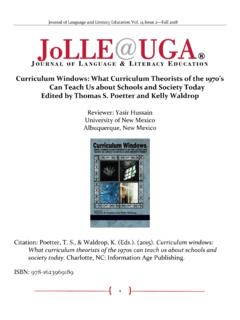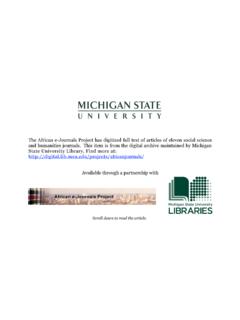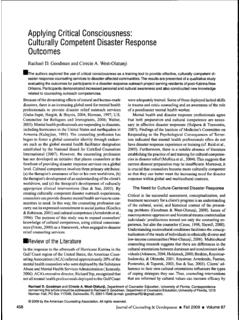Transcription of Reflection on Paulo Freire and Classroom Relevance
1 American International Journal of Social Science Vol. 2 No. 2; March 2013. Reflection on Paulo Freire and Classroom Relevance Emmy J. Rugut Ahmed A. Osman Moi University, School of education Department of Curriculum, Instruction and Educational Media Box 3900, Eldoret 30100, Kenya Abstract This paper focuses on the philosophical concepts of Paulo Freire on education . It reports on the Relevance of Freire 's ideas to the Classroom and its impact on the world of educator' and educatee'. The paper is a Reflection of Freire 's reaction to banking education ' and problem-posing model, culture-circle, codifications, praxis (action/intervention), Easter experience, dialogue and concientization. Freire has been able to draw upon and weave together a number of strands of thinking about educational practice and liberation .His theoretical innovations have had a considerable impact on the development of educational practice all over the world.
2 Keywords: banking education , Reflection , culture circle, codifications, praxis Introduction The paper focuses on the philosophy of Paulo Freire whose ideas has subsequently influenced many other academic disciplines and has remained an inspiration to many across the world. This Brazilian educator has been very revolutionary and political in his approach to educational issues and many have remained faithful to his convictions. His philosophy has a lot to offer to the field of education in all aspects and remains valid at all times. Freire s philosophy on education has permeated deeply in the education sector and has greatly influenced the approaches and models used in literacy learning. The influence of Freire in Latin America and Africa has been enormous. Working originally in the state education system, Freire conceived and developed adult literacy programs whose purpose was to assist the poorest people to learn to read and write through helping them to respect their own everyday language.
3 Freire insisted that the function of education was to build on the language, experiences and skills of the educatees , rather than imposing on them the culture of the educators . Freire left a significant mark on thinking about progressive practice. Freire was able to draw upon ,and weave together, a number of strands of thinking about educational practice and liberation. He has made a number of important theoretical innovations that have had a considerable impact on the development of educational practice- and on informal education and popular education in particular. Freire s philosophy begins from a deep respect and humility before poor and oppressed people and a respect for their understanding of the world they inhabit or common sense which constitutes a knowledge no less important than the scientific knowledge of the professional/dominant group/oppressors as he termed them (Darder, 2002).According to Freire this respect and humility fosters a condition of trust and communication between teacher (who also learns) and learner (who also teaches).
4 education becomes a collective activity, a dialogue between participants rather than a 'top-down' one- way lecture from one person for the benefit of the other. In saying this Freire did not intend to create conditions where learner s knowledge, feelings and understanding should go unchallenged or for the teacher to step back as a mere facilitator ( Freire , 1996). To me his belief that humility and respect fosters a situation characterized by trust is absolutely true. In many instances learning takes place when there is mutual respect and understanding between the teacher and the learner. The learners feelings and knowledge should also be challenged and directed by the teacher for meaningful learning to be achieved. 23. Centre for Promoting Ideas, USA According to Freire , the teacher has authority but does not become an authoritarian .He intervenes in order to help the learner reflect on aspects of his/her cultural ,social and gender constructs and help the learner to think critically.
5 His view of the teacher and the learner promotes human relations. The failure by the teachers and the learners to communicate has always resulted in strikes and demonstrations in our learning institutions. The benchmark that Freire used for evaluating experiences grew out of Christianized Marxist humanism (Mclaren, 2000). From this position, Freire urged both students and teachers to unlearn their race, class, and gender privileges and to engage in a dialogue with those whose experiences are very different from their own. Thus, he did not uncritically affirm student or teacher experiences but provided the conceptual tools with which to critically interrogate them so as to minimize their politically domesticating influences (hooks, 1994). Banking education In this form of education the teacher deposit in the minds of the learners who are considered to be empty or ignorant, bits of information or knowledge, much like we deposit money in a [empty] bank account.
6 This is why Freire called this model of education 'banking education '. Freire criticized this model of education because he believed it made students into passive objects to be acted upon by the teacher ( Freire , 1988). He argued that the goal of 'banking education ' is to demobilize the people within the existing establishment of power by conditioning them to accept the cultural, social, political status quo of the dominant culture. In the banking education model knowledge/ education is seen as a gift given to the student by the teacher who considers the learner as marginal, ignorant and resource-less. Freire saw this as false generosity from the dominant group (oppressors) and a way of dominating and controlling the people (the oppressed) to improve or maintain their own interests (Freire1973). Some of the tools a banking education model might use include a pre-prescribed curriculum, syllabus or course book, which either takes no account or makes assumptions of learners' views or knowledge of the world.
7 Freire called these pre-prescribed plans and course books primers (Freire1973). Freire argued that conventional learning was the tool of the elite because it treated students as objects upon which knowledge is deposited. Genuine learning for Freire , could only be achieved through lived experience, critical Reflection and praxis (Aronowitz, 1993). The banking education is not the best method of instruction; learners should be allowed to participate and also bring out what has been learned from their surroundings and earlier experiences. A problem-posing model To challenge the banking education model, Freire proposed a problem-posing model of education . In this model, the teacher and learner discuss and analyze their experiences, feelings and knowledge of the world together. Instead of the belief that learners' and teacher's situation in the world is fixed, as the banking model suggests, the problem-posing model explores problems or realities people find themselves in as something which can be transformed (Mclaren, 2000).
8 It is not the job of the teacher to provide answers to the problems, but to help the learners achieve a form of critical thinking about the situation, Freire called this conscientization (Freire1973). This makes it possible to understand that the world or society is not fixed and is potentially open to transformation. It becomes possible to imagine a new and different reality (Freire1988). In order to undertake this process successfully, the people (oppressed) must challenge their own perception of the dominant group (oppressor). Freire argued that the oppressed think of themselves as 'less than' or something lacking. He suggested that they have been conditioned to view the practices and behaviors of the dominant groups as complete, whole and correct. To become whole complete and correct means to simulate the practices of the dominant culture. To counter this perception means engaging the learner in a process of dis-identification with dominant culture/oppressor and to help the learner to imagine a new being and a new life according to their own rationality (Freire1973).
9 Learning can best be achieved through critical thinking and analysis of one s experiences and feelings. In many institutions, the best performed subjects are those that learners do it practically, for example Agriculture, Art and Design, Home science etc. 24. American International Journal of Social Science Vol. 2 No. 2; March 2013. Culture Circle Freire took education out of the Classroom and created the culture circle , where learners used their own ways of speaking to articulate their shared understanding of how their world came to be like it was and how to act to change their future. From being a monologue process, education became a process of dialogue in which educatees and educators engaged in mutually respectful learning. Through the culture circles process, people progressed very quickly: in Brazil illiterate adults learned to read and write in 30 hours; and in Nicaragua illiteracy was reduced from 40% to 13% in two months.
10 Freire pointed out that the astounding results achieved by the culture circles were a consequence of offering literacy as a tool through which groups, rather than individuals, could be empowered. In culture circles, everyone makes good progress, not just a few isolated star-pupils ( ). The concrete basis for Freire 's dialogical system of education is the culture circle, in which students and coordinator together discuss generative themes that have significance within the context of students' lives ( Freire , 1988). These themes, which are related to nature, culture, work, and relationships, are discovered through the cooperative research of educators and students. They express, in an open rather than propagandistic fashion, the principle contradictions that confront the students in their world. These themes are then represented in the form of codifications (usually visual representations) that are taken as the basis for dialogue within the circle.
